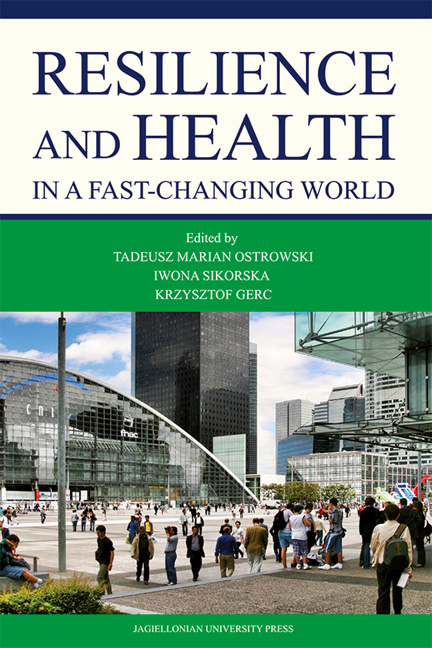Book contents
- Frontmatter
- Table of Contents
- Resilience from a Variety of Theoretical Perspectives: an Introduction
- I RESILIENCE IN THE PHILOSOPHICAL AND THE EXISTENTIAL CONTEXTS
- II SOCIAL CONTEXTS OF RESILIENCE
- Tough, Resistant, Hard: Resilience and Criminality
- Parentification and Psychological Resilience – the Example of Maturity Levels of Defense Mechanisms
- Science of Art in Prison
- III PROMOTING OF RESILIENCE AND ASSISTED RESILIENCE
- IV THREATS TO MENTAL HEALTH
- List of Authors
Science of Art in Prison
from II - SOCIAL CONTEXTS OF RESILIENCE
Published online by Cambridge University Press: 12 January 2018
- Frontmatter
- Table of Contents
- Resilience from a Variety of Theoretical Perspectives: an Introduction
- I RESILIENCE IN THE PHILOSOPHICAL AND THE EXISTENTIAL CONTEXTS
- II SOCIAL CONTEXTS OF RESILIENCE
- Tough, Resistant, Hard: Resilience and Criminality
- Parentification and Psychological Resilience – the Example of Maturity Levels of Defense Mechanisms
- Science of Art in Prison
- III PROMOTING OF RESILIENCE AND ASSISTED RESILIENCE
- IV THREATS TO MENTAL HEALTH
- List of Authors
Summary
Abstract
Penitentiary isolation is associated with deprivation of prisoners needs as well as threat and conflict situations. Significantly reduced relationships with the social environment is accompanied by the inevitability to adapt to the realities of a total institution. Prisoners are also influenced by stigmatization, standardization, depersonalization and degradation. Significant components of their psychological situation is violence, boredom and loneliness. The aim of the presentation is to characterize the main determinants of somatic and mental health of prisoners and describe selected prevention programs, which can raise their level of psychological resistance. Selected results of the author's research on using art in the process of penitentiary correction will also be presented. The research was carried out within the project “Labyrinth of Freedom” (in the Nowy Wisnicz prison) and the “Horizon of Freedom” (in the Detention Center in Radom).
Key words: prison, art, correction, science
Introduction. Prison as a Life Environment
A prisoner serves his sentence in a monotone, routinized environment. Prisons around the world share a similar architecture (Christianson, 2004). The priorities are, obviously, isolating prisoners from the rest of society and ensuring security within the facility. Permanent fixtures found in the architecture of penitentiary facilities are high walls, barred windows and barbed wire.
The essence of a custodial sentence is the subjection of a criminal to enforced isolation. The psychological aspects of prison isolation are the most detrimental to inmates. The circumstances surrounding penitentiary isolation can be described in terms of the stress and challenging situations with which the prisoner is confronted. Situations involving the deprivation of needs, threats and various types of conflicts take on unique dimensions within prison walls. The requirement to adapt to the realities of a total institution is accompanied by extensive restrictions in relations with the social environment. Inmates are subjected to the workings of the phenomenon of prizonization. This term is used to characterize the process and the effects of prisoners adapting to the conditions of a penal facility. According to Haney (2002, pp. 79–84), prizonization includes the following symptoms: dependence on institutional structure and contingencies, hypervigilance, interpersonal distrust and suspicion, emotional over-control, alienation and psychological distancing, social withdrawal and isolation, incorporation of exploitative norms of prison culture, diminished sense of self-worth and personal value. It may also cause post-traumatic stress reactions.
- Type
- Chapter
- Information
- Resilience and Health in a Fast-changing World , pp. 93 - 106Publisher: Jagiellonian University PressPrint publication year: 2015



